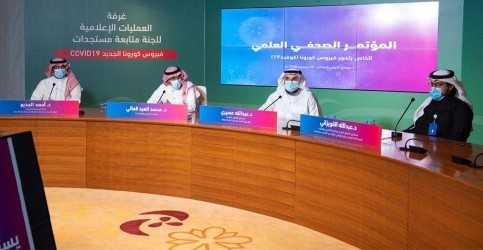
Dr. Muhammad Al-Abdulaali, Assistant Minister of Health and MOH spokesman, has declared that the rapid proactive measures taken by the Kingdom reaffirms the priority of human health. He has also stressed that no coronavirus mutation has been detected in the Kingdom so far.
Dr. Al-Abdulaali made this statement during the COVID-19 briefing, held on Tuesday, which witnessed the participation of Dr. Abdullah Mefarreh Assiri, Infectious Diseases Consultant and Assistant Deputy Minister for Preventive Health, Prof. Dr. Ahmad Hamdan Al-Judie, Clinical Pharmacy Professor and Assistant Deputy Minister for Medical Ancillary Services, as well as Dr. Abdullah bin Rashoud Al-Qawizani, Infectious Diseases and Epidemic Control Consultant and Chief Executive of the Saudi Center for Disease Prevention and Control.
In this regard, MOH spokesman has noted that all measures taken were proactive to facilitate evaluation. He added that the measures acted as a significant opportunity to view and analyze studies, then to evaluate the final actions appropriate to conditions.
“We have to trust all the steps taken,” Al-Abdulaali said. “We have scientific committees and experts that follow up and monitor all developments related to such pandemic and virus on the one hand, and the way to deal with them scientifically, practically and globally on the other.” In addition, he has required that all arriving and transit passengers during the past three months, especially from Europe, Australia and South Africa as evaluated by Weqaya Center, must abide by a fourteen-day home quarantine and undergo a repetitive laboratory test every 5 days.
For his part, Dr. Abdullah Assiri has confirmed that mutations were frequently detected in viruses. RNA Viruses, including COVID-19, are commonly characterized with a life cycle full of mutations. COVID-19 has witnessed multiple mutations during the pandemic. He further pointed out that despite the recent detection of COVID-19 mutations followed by epidemiological alerts in the United Kingdom, such mutations might have led to an increase in the virus's transmissibility in humans. However, such data is still preliminary, and cannot be regarded as conclusive evidence that the virus has become more likely to spread.
“Such mutations have caused no changes in the virus’s method and ability to infect humans severely. So far there is no proof that COVID-19 is more virulent than the previous strains detected in the rest of Coronaviruses,” said the Assistant Deputy for Preventive Health. He highlighted that such multiple mutations occurred in only a fraction of the virus. However, they are unexpected to affect the method to handle the virus in terms of infection control, preventive measures, as well as treatment protocols and vaccinations.
On the other hand, Prof. Dr. Ahmad Al-Judie has affirmed that virus variants caused multiple spike protein mutations, some of which were located within the receptor binding domain due to reproduction. “Such mutations usually occur in a lot of RNA viruses such as influenza and cold. They are not necessarily defined by increase in the virus’s severity or resistance to drugs and vaccines. On the contrary, mutations may weaken the virus. Till now, there is no data on such gene mutations’ phenotypes and the extents to which they affect the impact of antibodies on the neutralization of the variant. It is worth mentioning that at present the variant’s antigenic characterization is ongoing, while results are expected in the next few weeks,” he has said.
Within the same framework, the Assistant Deputy for Medical Ancillary Services has added, “Be assured that there is still no reason to worry about the non-effectiveness of the current vaccines. We are still following up research on such topic and data issued by health authorities in the countries of spread.”
Dr. Abdullah Al-Qawizani, Infectious Diseases and Epidemic Control Consultant and Chief Executive of the Saudi Center for Disease Prevention and Control, in turn, has spoken about gene mutations in viruses. He said: “Viruses change constantly through mutation and the emergence of a new variant is an expected occurrence. A diversification of SARS-CoV-2 due to evolution and adaptation processes has been observed globally and is expected to occur with ongoing transmission of viruses in general and particularly for RNA.”
Al-Qawizani went on to say: “Most mutations that emerge will not provide selective advantage to the virus. However, some mutations or combinations of mutations may provide the virus with a selective advantage, such as increased transmissibility through an increase in receptor binding, the ability to evade the host immune response or infection severity.”
“In terms of clinical and epidemiological impacts of such variant,” he added, “poorer clinical outcomes or higher mortality have not been reported to date. As regards possible impact on vaccine match and effectiveness, no phenotypic data are available for the new variant and no data are available with respect to the ability of antibodies elicited by vaccines under development to neutralize this variant. However, the investigations into the properties of this new variant are ongoing.”
It is worth mentioning that Dr. Al-Qawizani has shed light on the role played by the Saudi Center for Disease Prevention and Control with respect to the new variant. The National Program for the Study of Complete Genome Sequencing of Coronavirus is still ongoing. The genetic sequence of positive cases coming from European countries, or any country where the epidemic has appeared, is being mapped. Moreover, the global epidemiological situation of the spread of new strains and mutations of the virus is being monitored. Besides, clinical and epidemiological impacts of mutations on vaccines, drugs and laboratory tests are being studied and followed up. Follow-up is continued and efforts are doubled in order to detect the local or global changes in the virus’s severity or transmissibility.